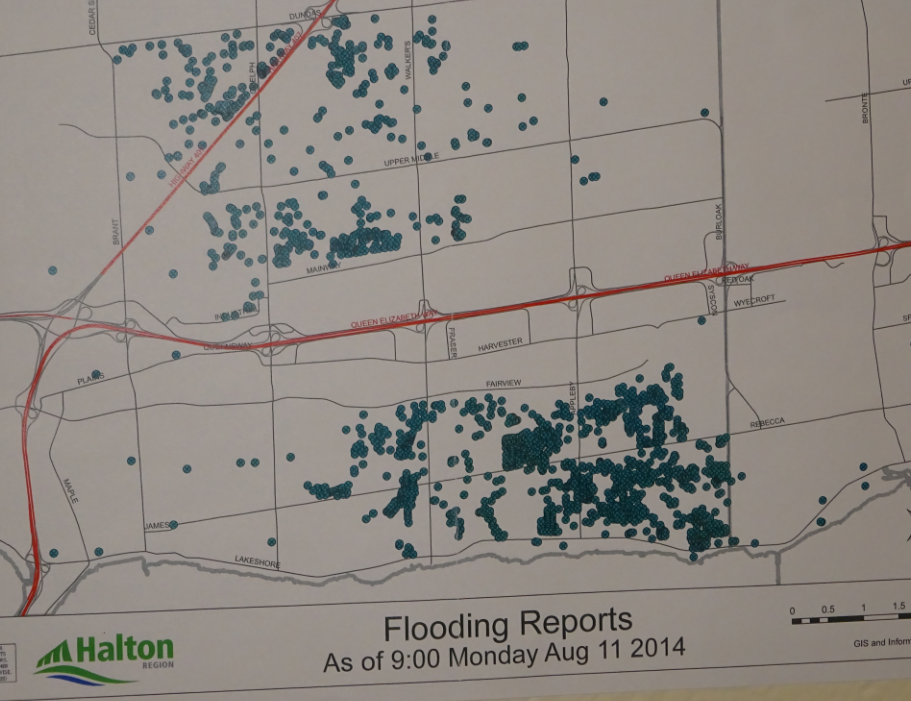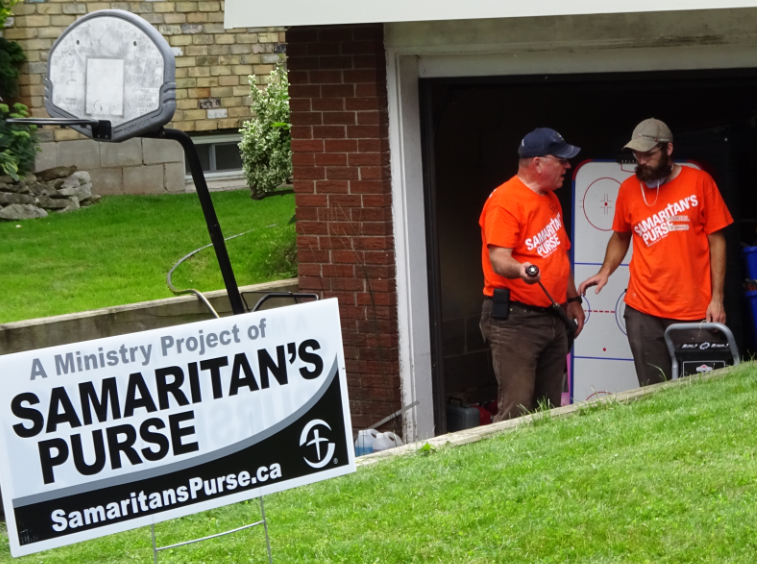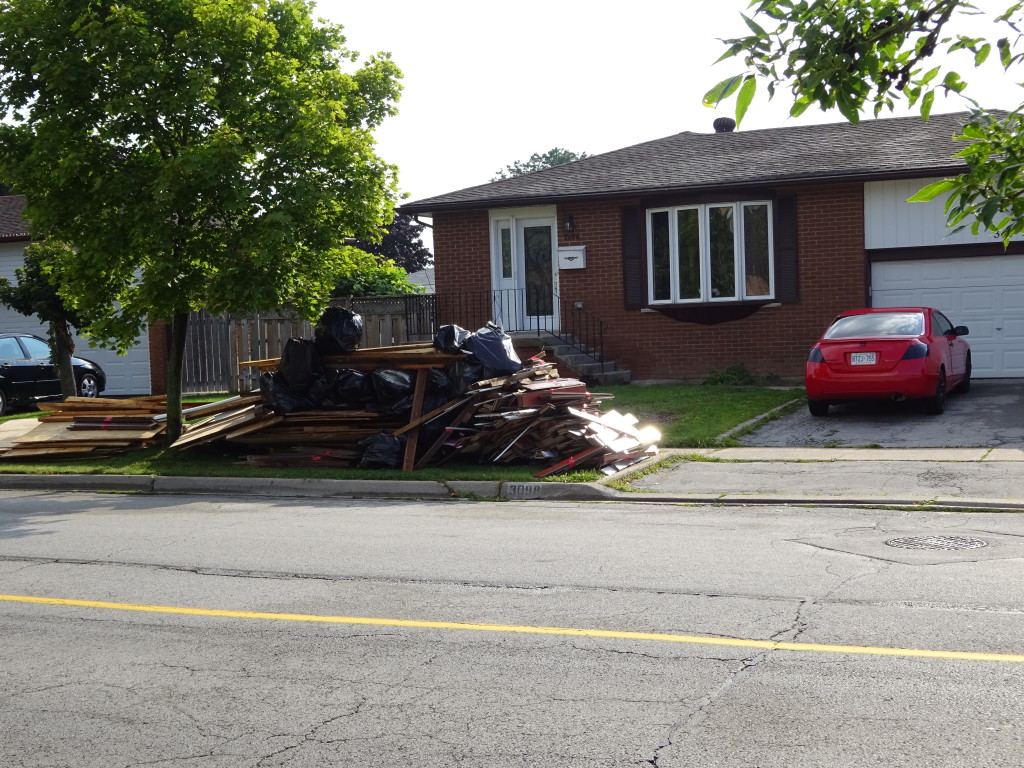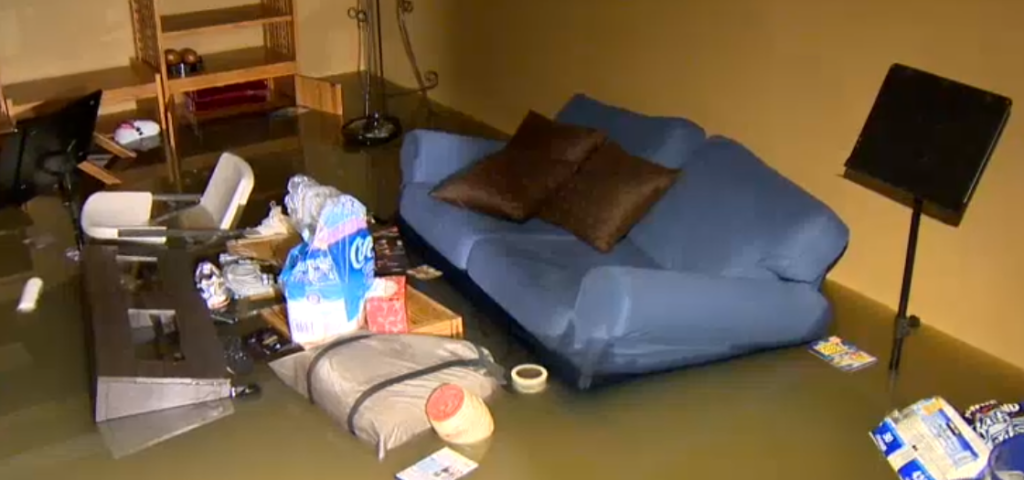 By Pepper Parr
By Pepper Parr
August 24, 2014
BURLINGTON, ON.
Sometime soon – the Burlington Community Foundation will announce who the Chair of the local Disaster Relief Assistance Committee is going to be, and the flow of information for those unfortunate people who lost so much during the August 4th flood will begin.
It is going to be a complex process – governments just don’t hand out money willy- nilly.
The program, known as ODRAP, for Ontario Disaster Relief Assistance Program, is intended to assist those whose essential property has been extensively damaged as a result of a sudden, unexpected natural disaster such as a severe windstorm, tornado or flood.
The ODRAP program contains a private component and a public component. The public is used by the municipality to recover as much as they can of the cost of the flooding to the city. Burlington will be working with Halton Region on this.

Each dot represent a home that was damaged in the August 4th flood. The data shown here was as of August 11th – there is more to show,
The private component is intended for people who lost property and suffered significant damage to their homes. The first step in what will prove to be an exhausting process, was for the city to request that it be declared a disaster area. That happened on August 14th, when the city passed a resolution asking the Minister of Housing and Community Services to make that declaration.
That declaration has yet to be made by the Minister – but it is expected to happen in the very near future.
The program provides financial assistance within the declared disaster area, to restore private property to pre-disaster condition, when the cost of restoration exceeds the financial capacity of the affected individuals, municipality and community at large.

While people worked at creating the administrative structure needed to get donations from the public and funds from the province into place – church groups were out on the street giving aid to clean up basements where needed. The Samaritan`s Purse expects to have partially restored close to 100 homes.
ODRAP is not a substitute for adequate insurance coverage and does not provide full cost recovery.
The city enters into a legal agreement with the province, which calls for the city to (a) raise funds locally ($140,000 has been raised as of Friday, which the province “may” match on a two for one basis and (b) create the local Disaster Committee.
The province defines all areas damaged by the disaster, and whether all or a specified portion of the municipality is to be declared a disaster area.
When a disaster area is declared, a legal agreement is established between the Minister and affected municipality for accountability purposes.
The public component of ODRAP provides assistance to municipalities, when damage is so extensive that it exceeds the capacity of the affected municipality to manage. Burlington will be going after the province for the damage done to its infrastructure – the Region will be right in there with the city.
Municipalities within the declared disaster area may receive repayment/reimbursement of up to 100 per cent of eligible costs for uninsured municipal damage associated with a disaster.
The Private component of ODRAP requires individuals to bear the initial responsibility for their losses. If the losses are so extensive that individuals cannot cope on their own, the municipality and the community at large are expected to provide support.
The private component of ODRAP is intended to provide the “necessities of life” to help those impacted by a natural disaster get back on their feet, when it is beyond the capacity of the municipality or community to assist.
Local fund raising is what gets things rolling. To date people have donated $140,000. Once the local Disaster Relief Committee is fully operational, there will be a drive to pull in donations from people in a position to write big cheques as well as a major drive to the commercial/corporate sector.
The province may match funds up to a 2 to 1 ratio to settle the claims, up to 90 per cent of the estimated eligible amount.
Once the Disaster Relief Committee is set up, with the sub-committees it will require, one of their early tasks is going to be getting information out to the community and then receiving and settling the eligible claims of the victims as efficiently as possible.
The Disaster Relief committee members cannot be members of council and should have no conflict of interest in the collection and distribution of funds. The committee should avoid selecting members, who will likely be submitting claims for damages.
The disaster relief committee and its sub-committees, act autonomously from municipal council, operating within provincial guidelines to raise funds and settle claims. The committee ensures that all claims are dealt with fairly and equitably. Depending on the severity of the disaster, the disaster relief committee may operate for a period of several months or for up to one year or more, in order to receive and settle all claims.

Seeing much of your house sitting at the curb waiting to be hauled to the dump, was very painful and expensive for hundreds of Burlington residents. The Region increased the collection days so that we didn`t see these piles of refuse on the streets for very long – which made it easy to forget how extensive the damage actually was.
Members of the Disaster Relief Committee receive no remuneration. They can be reimbursed for expenses, however, such as travel to meetings.
Usually program administration, financial records and payments are made by a municipality upon the recommendation of the Disaster Relief Committee. The program administration costs of the Disaster Relief Committee are incremental to normal municipal administration activities, and are eligible for reimbursement from the Ministry. These costs could include:
A program manager to assist the disaster relief committee with day to day operations, fundraising and claim settlement;
An insurance adjuster to assist with reviewing claims;
Secretarial and other support staff fees, audit fees, stationary, printing, advertising and postage costs;
Rental of office space and furniture if necessary.
All administrative expenditures of the local disaster relief committee must be documented and kept separate from fundraising. No administrative costs are to be deducted by the disaster relief committee, from the locally raised funds. All donations must be channeled directly to the disaster relief committee to be matched with provincial funds up to 2:1 and used for claim settlement.
The responsibilities of the Disaster Relief Committee are as follows:
1. Appoint a chairperson and appropriate vice-chairs for sub-committees, where established;
2. Appoint a treasurer and a secretary, if one is required. The treasurer should not be a member of the committee but should be a municipal staff person or, depending on the scale of the emergency, a paid contract position;
3. Establish a disaster relief fund and bank account to receive donations;
4. Register as a charity with Revenue Canada to receive a charitable registration number, if not available through the municipality;
5. Solicit donations to the fund and organize fundraising activities;
6. Establish procedures for the receipt, appraisal, and settlement of claims for losses and damage;
7. Advise the municipality to issue advance payments in exceptional circumstances not exceeding 50 per cent of the estimated eligible payout;
8. Distribute claim forms;
9. Advertise the existence of the fund, availability of assistance, and terms on which assistance will be provided;
10. Appraise damage for claims less than $500 and, if necessary, hire professional adjuster(s) for claims greater than $500;
11. Approve payments in a consistent manner based on reports from the adjuster and/or program manager, and in accordance with ODRAP guidelines and the committee’s procedures;
12. Advise the municipality to make payments to claimants using the municipal financial system;
13. Hire auditors to review the activities of the fund and prepare an audit report; and
14. Submit an audited report to the regional Municipal Services Office for review and final payment of the provincial contribution.
ODRAP is not an alternative to adequate private insurance coverage and sound risk management practices. Claims from households and businesses should be directed first to insurance companies to determine the policy holder’s coverage.

For homes that didn`t have, or could not get adequate insurance the ODRAP program might pay as much as 90% of the cost of replacing essentials.
Burlington hasn’t dealt with a disaster of this magnitude before – there will be a learning curve and it will take a bit of time to get it all running smoothly. The names of some very competent people are being tossed around to head up the Disaster Relief Operation. Let us hope that those who can make things happen, step up and take on the task.
It would have been useful if city hall, the Mayor in particular, had kept up a steady flow of information during the period of time, when procedures are being put in place. The paucity of information from city hall was embarrassing – distressing as well. The public was told that City Talk – the city`s in house magazine that tells you what the city has done for you will be distributed to every home in the city.














